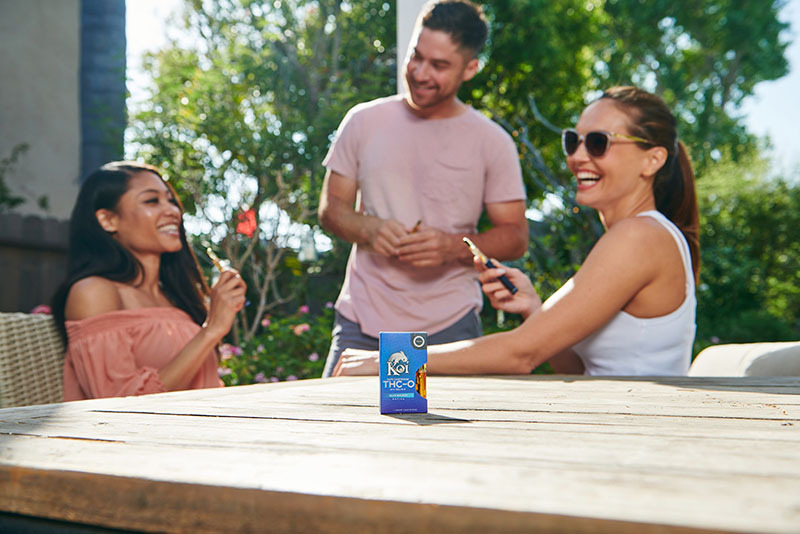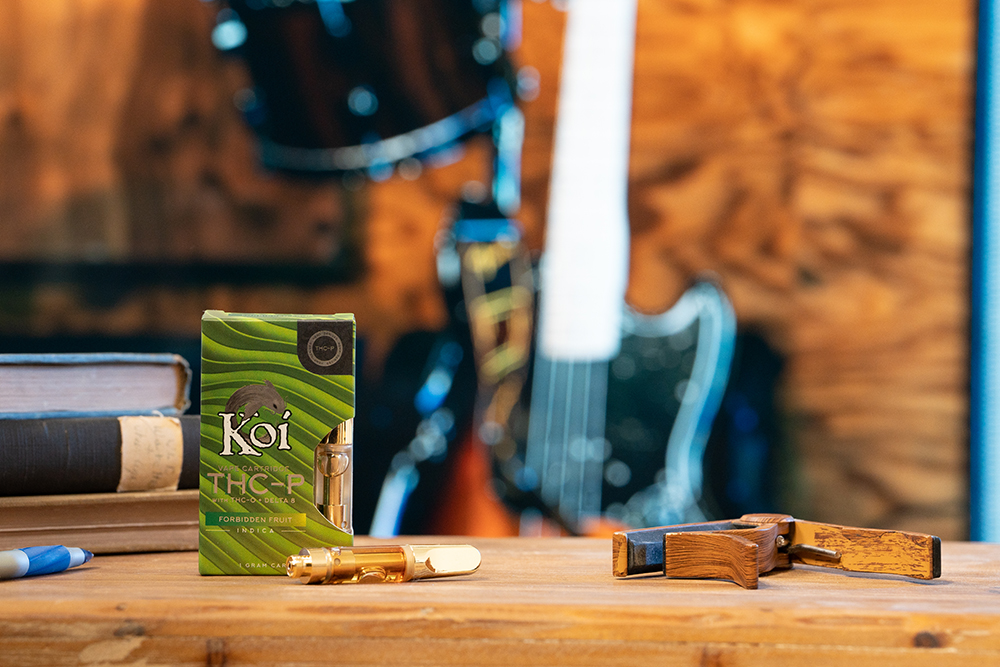THC-O and THC-P are two hemp cannabinoids recently made legally available under the 2018 Farm Bill. While both are known for their potent effects, the two have distinct differences you'll want to know as you decide between them.
Key takeaways:
- THC-O and THC-P are two immensely potent hemp-derived compounds.
- THC-P is significantly stronger than THC-O. Both deliver more intense effects than conventional THC.
- THC-P naturally occurs in the plant, whereas THC-O is created from other naturally occurring hemp cannabinoids.
- Both cannabinoids are federally legal under the 2018 Farm Bill, but regulations could change.
If you use hemp to feel and function better, the 2018 Farm Bill opened a world of opportunities. Since the U.S. federal law passed, the number of hemp cannabinoids made legally available has grown.
Even more impressively, cannabinoids discovered years ago are much more widely available today. As a result, you can now enjoy various products and cannabinoids to suit your preferences. And the best part is new options are regularly popping up.
Two of these newly available cannabinoids are THC-O and THC-P. If you're already guessing they're somehow related to conventional THC, you're not wrong. They are. But there's more!
What is THC-O?
Of the two hemp cannabinoids, THC-O has the closest similarities to Delta 9 THC. The term THC-O is the name of an ester form of delta 9 THC. Meaning it's THC that has been slightly changed at a molecular level using acetic anhydride and sulfuric acid.
Simply put, THC-O is a modified version of the good old delta 9 THC. THC-O and delta 9 carry many similar effects and even turn into the same metabolite (THC-COOH) after you've consumed and your body has metabolized the compound.
Although THC-O is an analog of THC, they're not the same. THC-O has an acetate molecule, whereas delta 9 doesn't. This slight difference makes a huge impact. Because of it, your body absorbs THC-O more efficiently, so more reaches your body's systems for more potent effects.
Learn more: What is THC-O?
What are the Benefits of THC-O?
When it comes to our formal understanding of the benefits of THC-O, it's important first to note that research needs to be improved. Most of what we know comes from what people who have used THC-O have shared: consumer reports and opinions on what the cannabinoid may offer and the type of experience it creates.
It's worth noting that this anecdotal evidence is promising. Still, the effects and benefits you experience from THC-O might vary depending on some personal factors and the concentration of your THC-O products. Expected potential THC-O benefits include:
Strong elevating effects
The most common reason people use THC-O is for its reportedly powerfully uplifting effects. THC-O is considerably more potent than traditional delta 9 THC. So, when you compare THC-O vs delta 9, THC-O can be an excellent upgrade for those looking for a more intense experience. THC-O is also known for stimulating deep thought and introspection. It tends to deliver a more immersive experience than other cannabinoids.
Natural relief
Like some other cannabinoids, THC-O helps your body feel better overall. By stimulating the body's endocannabinoid system, the cannabinoid may help your body better regulate various functions. When your body is better balanced, you feel and function better.
Sleep support
THC-O has calming and soothing effects that can help improve sleep quality. It helps quiet busy thoughts that keep you up later than you'd like. It needs to be clarified whether THC-O's positive influence on sleep comes more from its sedative benefits or creates the right environment to make it easier to fall and stay asleep.
Appetite support
Because of their similarities, you should expect that THC-O will carry over some of the benefits of delta 9. One is healthy appetite support. By binding with your endocannabinoid system's CB1 receptors, THC-O might make eating more enjoyable. More studies and research into THC-O could go a long way in making scientific conclusions about the benefits of THC-O. However, initial reports are promising and have fueled the popularity of THC-O.

What is THC-P?
THC-P, or THCP, is another analog found in hemp plants but in lower quantities. Tetrahydrocannabiphorol, as it's known in full, makes up only 0.1% of the cannabinoid profile in the plant.
It is one of the newest cannabinoids on the hemp stage, having only been discovered by researchers in 2019. But, already, it's taken off because of its unmatched potency.
Early research suggests that THC-P could be 33x more potent than delta 9 THC. So theoretically, 1mg of THCP could be equivalent to 33mg of delta-9 THC.
Learn more: What is THC-P?
What are the Benefits of THC-P?
The appeal of THC-P is in its potency. Research has found that THC-P is far more potent than conventional THC. If you've given delta 9 THC a try, you will likely have a similar but more intense experience with THC-P. However, the compound is still new, and its benefits from different consumers are still streaming in.
When assessing the benefits of THC-P, it's important to note people respond to cannabinoids differently, and THC-P is not different. However, most people have shared that THC-P delivers intense relief and deep relaxation that helps them unwind at the end of the day.
How Were They Discovered?
The discoveries of THC-P and THC-O happened roughly 70 years apart. Because of their similarities yet differences at the time of discovery, THC-P is often referred to as the younger cousin of THC-O.
THC-O was first discovered by the U.S. Army sometime during dog experiments as early as the 1940s.
THC-P's discovery was much later, in 2019. But, like THC-O, its discovery was accidental. A research team identified it after they received a cannabis cultivar called FM2, supplied by the Italian military. The team relied on mass spectrology and liquid chromatography to get a detailed look into the plant matter and distinguish the compound. Fun note: during the research, they also identified CBDP, an analog of CBD.
More research is needed on both compounds, but there's a lot of optimism from the initial anecdotal reports and the few studies conducted. Although new to the legal hemp industry, THC-O and THC-P are already popular go-tos for anyone seeking powerful effects from hemp.
How Do They Work?
As with all cannabinoids, THC-O and THC-P work through the endocannabinoid system (ECS). Your ECS is a significant regulatory network responsible for keeping a wide range of functions balanced and running at their best. However, while we know the two compounds stimulate the ECS, exact details about how they work and interact with the body are still unclear.
But one thing is evident. Because of their ability to produce uplifting effects, experts suggest they directly interact with the endocannabinoid system's CB1 receptors. It's also possible that both cannabinoids interact with other receptors and hormones to influence various effects like natural relief and sleep.
There's still a lot to learn about THC-O and THC-P, but preliminary evidence shows they both work the same way in the body. However, THC-P shows more affinity to the CB1 receptors, hence its more potent effects.
There might also be some slight differences in the receptors and hormones they affect and how they affect them because the benefits vary slightly.
Which One is More Potent?
For most people, both THC-O and THC-P deliver stronger effects than conventional THC. But of the two, THCP has more potent uplifting effects. It's thought to be at least twice more powerful as THC-O and up to 33 times stronger than delta 9.
THC-P is thought to have more potent effects than THC-O because of the length of its alkyl chain. THCP has a seven-link alkyl side chain, while THC-O has a five-link alkyl side chain.
The alkyl side chain is known as the main chain or backbone. A string of carbon atoms indicates how a cannabinoid interacts with the ECS receptors.
Anecdotal evidence suggests that THCP creates similar sensations to delta 9 with added physical and mental effects.

When Will I Feel the Effects of THCP and THC-O?
The time it takes to feel the effects of THC-O versus THCP differ significantly. This is because THC-O needs to be metabolized to activate, so there's a noticeable delay in the onset of effects compared to THC-O.
THC-O takes at least 20 minutes to kick in when inhaled by vaping or other techniques. The effects take even longer when you take edibles like THC-O gummies. But on the flip side, THC-O effects tend to last longer than THCP's. Regardless of the consumption method, THC-O has to be metabolized before you can start feeling the effects.
Also, the type of product you use will influence the time it takes for the effects of either compound to kick in:
- Edibles - When ingested orally as edibles, the effects of THCP and THCO can take between 30 to 90 minutes to kick in, depending on your metabolism. The onset also depends on whether you take the edibles on a full or empty stomach. Although taking THCP and THCO edibles takes the longest to feel the effects, the effects last longer than other forms.
- Vape carts - THCP and THC-O can be mixed with terpenes to create vape liquids. When you use THC-O vape cartridges or THC-P vape cartridges, you can feel the effects in 20 minutes, sometimes faster, lasting roughly 4 hours.
- Tinctures – While rare, tinctures have a relatively high bioavailability when taken sublingually (under the tongue). The effects can occur within 30 minutes and last a few hours.
Are They Legal?
Legality is a huge factor when considering which hemp cannabinoids to enjoy. Considering THC-O and THC-P are relatively new, a big concern you may have is whether the products are legal.
The 2018 Farm Bill legalized hemp and hemp-derived cannabinoids. The bill specifies that all hemp-derived products are legal if they contain 0.3% delta 9 THC or less.
States can pass laws related to cannabinoids. As a result, some may elect to restrict their purchase and use.
In short, THC-O and THC-P derived from hemp are currently legal at the federal level. However, the laws might differ at the state level, so you should check your local laws before buying and consuming any THC-O and THC-P products.
Choosing Between THC-P and THC-P
The benefits of THC-O and THC-P are intertwined. Both cannabinoids offer similar benefits but might slightly differ in experience and effectiveness for you.
In many cases, you can find products that combine cannabinoids like these together for an even more unique experience.
But, if your choice to choose one over the other, it's worth considering which one does a better job at the type of benefits you're looking for.
Which One is Better for Sleep?
People widely use both THC-O and THC-P for sleep support. They both deliver a sense of relaxation that can help your mind unwind and prepare your body for serious rest. Unfortunately, there has yet to be much information about either for promoting better sleep. But we know from people who use both cannabinoids that they're popular nighttime picks for mellowing out.
Which One is Better for Stress Relief?
Both THC-O and THC-P are fantastic relaxants when used in the right servings. They can help remove the edge without overwhelming you, provided you get the serving size right. However, too much of either can lead to feelings of uneasiness, the last thing you're looking for.
Although taking high amounts for enhanced relaxing effects might sound like a good idea, it's not. Taking too much for your tolerance level could quickly work you up instead of being relaxed.
Some prefer to take THC-O or THC-P alongside CBD products, which provide a sense of homeostasis and calm.
Which One is Better for Natural Relief?
Finally, there's the question of discomfort. Almost every cannabinoid you've come across has some soreness support properties. But which one does better, between THC-O and THC-P?
There's not enough research to measure the natural relief benefits of THC-O and THC-P to confidently say which one is better than the other in terms of helping you feel better.
We can only go by the evidence that they act similarly to delta 9 and what we've heard people share. That said, because of the potency advantage of THC-P, you may need less of it to experience the same effects.
Are They Safe?
There's evidence that THC-O and THC-P have fantastic wellness benefits. But given their great potency, are they safe?
First, there is little peer-reviewed scientific research on the safety profile of either cannabinoid. And you should always talk to your doctor before starting a new cannabinoid routine.
What we have to go off are user reports. And so far, they suggest that THC-O and THC-P have similar safety profiles as widely-used THC.
The most considerable risk to whether THC-O is safe is the lack of regulations ensuring product quality. The same is the case for THC-P.
Both compounds are primarily made from other cannabinoids. Because chemical and lab processes are involved, it is critical to find suppliers who use safe and quality ingredients and practices in their manufacturing process. Plus, before purchasing any THC-O or THC-P product, you should ensure they have undergone third-party lab testing and that the final product doesn't contain harmful contaminants.
Unfortunately, the lack of regulations means some brands will try to make money by selling substandard products. Therefore, the safety of THC-O and THC-P depends on your ability to research and ensure you find reputable and reliable brands with high-quality standards for their products.
THC-O and THC-P Vs Other Cannabinoids
A lot about THC-O and THC-P focuses on their similarities with delta 9 THC. But how do they compare with other cannabinoids?
CBD
The only similarity between CBD and THCP is that both compounds exist naturally in cannabis, but CBD is found in much larger concentrations. THC-O has virtually no similarities with CBD.
Unlike THC-O and THC-P, CBD doesn't activate CB1 receptors. Instead, it interacts with CB2 receptors, 5-HT1A, and TRPV1 receptors, among others. CBD encourages a sense of balance and calm and promotes better wellness naturally.
CBN
CBN, THC-O, and THC-P have very different effects. CBN is considered a weak agonist of the CB1 receptors, so it's only mildly psychoactive, if at all. It certainly lacks the powerful euphoric effects that THC-O and THC-P have.
Instead, CBN products have sedative properties that encourage sleepiness.
Learn more: What is CBN?
Final Thoughts on THC-O vs THC-P
THC-O and THC-P are two hemp cannabinoids best for experienced users looking for a more potent experience. If you're exploring them for yourself, find a reputable brand that has been in the industry for years and uses rigorous manufacturing and testing processes, so you know you're getting quality products.


 BEST SELLERS
BEST SELLERS
 NEW RELEASES
NEW RELEASES
 SHOP ALL
SHOP ALL




